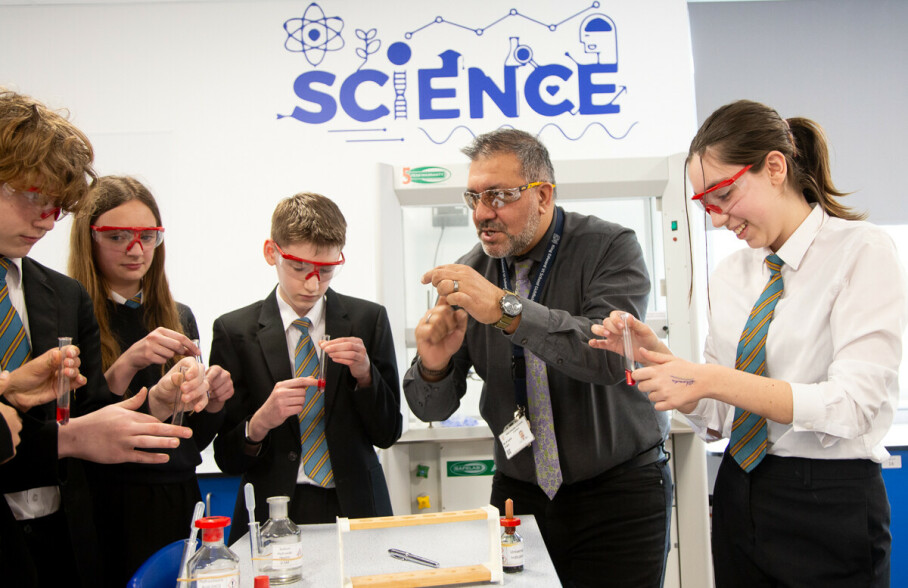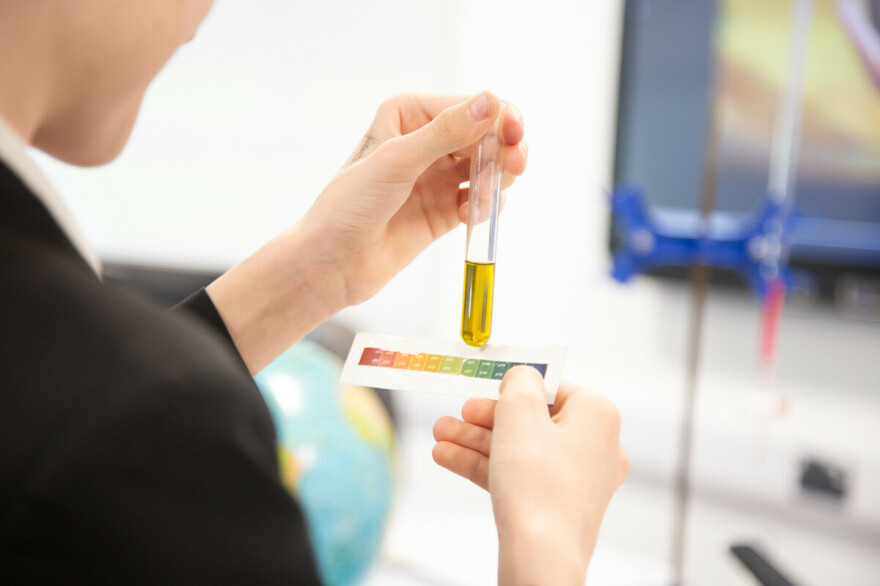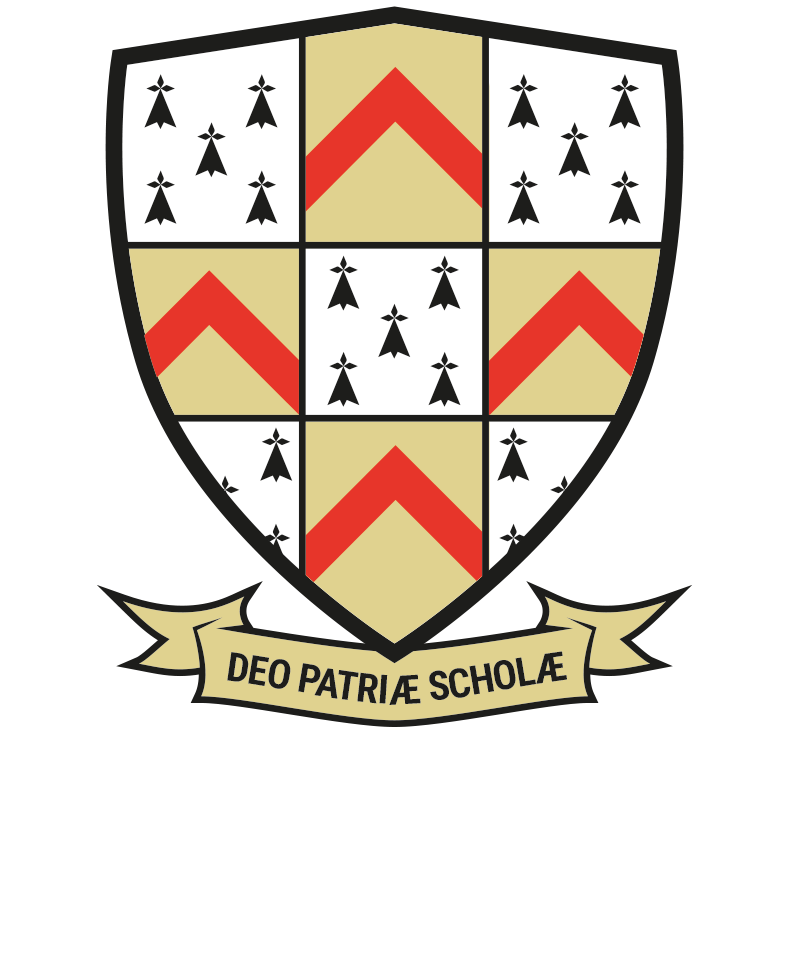Science
Curriculum overview
Science is everywhere in today’s world. It is part of our daily lives, from cooking and gardening, to recycling and comprehending the daily weather report, to reading a map and using a computer. The advances in technology and science are transforming our world at an incredible pace, and our children’s future will surely be filled with leaps in technology we can only begin to imagine. Being “science literate” will no longer be just an advantage but an absolute necessity. We can’t escape from the significance of science in our world.
Overall intent
King Edward VI Schools Science team of specialist Physics, Chemistry and Biology teachers believe in bringing an ambitious and enjoyable science curriculum to all students. Our desire to nurture a love of learning and foster curiosity underpins the planning of exciting lessons which include frequent experiments and opportunities to develop critical thinking skills.
Students are taught a carefully planned sequence of essential principles, knowledge and skills which they revisit, develop, consolidate, practice and apply throughout their learning journey. The relevance of science in our everyday lives is promoted through examples such as cooking, fireworks, car design and fitness programmes. Students also learn about career opportunities that include ‘blue skies’ research, biotechnology, engineering and set design.
Studying science involves addressing big moral issues such as climate change, energy production, transport choices, population and health. Our intention is to give students a strong foundation of knowledge and understanding to think critically about data and proposals presented in our rapidly changing world. Furthermore, our students are encouraged to think creatively about the opportunities which science and technology can offer to provide solutions in the future.

Embedding literacy
Each year students will be taught new scientific terms and given the opportunity to practice their use. Over 5 years we build up a large technical vocabulary; revisiting and recapping words repeatedly to develop confidence and understanding. Teachers explain new vocabulary carefully, showing links to other words and pointing out where the scientific meaning differs from other contexts. Key terms are taught by helping students to understand the root word by splitting it down into the constituent parts. This gives them the confidence to interpret new words when encountered both within science and the wider curriculum. Teachers model scientific explanations with students, helping them to structure their writing so that they express their conclusions clearly and succinctly. Reading for knowledge and pleasure are promoted by our enthusiastic team sharing books and articles which inspire.
Encouraging independence
Effective and pertinent practical activities are at the heart of the curriculum here at King Edward VI School, Lichfield and we pride ourselves in our ability to effectively deliver them and use every opportunity for the students to improve their independent enquiry skills right the way through the key stages. We feel practical activities support and consolidate scientific concepts, develop transferable skills and build and master practical skills.
The Physics department has recently been awarded the Isaac Physics Embedded School status at Gold level by Cambridge University. Isaac Science is a project funded by the University of Cambridge and supported by the Ogden Trust. It aims to empower all students by free access to high quality science learning resources, irrespective of location, background, school or environment. With regular use of our problem-solving questions, students develop the fluency and ability in scientific and mathematical analysis that is required for university and to raise their grades. Educational research undertaken over several years supports these findings and the Isaac Science brand is highly respected by schools and universities.
Awards are made to schools in which teachers have set Isaac Science assignments regularly to students over the previous academic year. There are fixed thresholds for Bronze, Silver and Gold awards.

Fieldwork and enrichment
There are various enrichment activities depending on the key stage. At Key Stage 3 we tend to organise trips to science fairs to enthuse our students and organise STEM. Key Stage 4 Physics will enter the students into the Olympiad and Chemistry enters the Top of the Bench Competition.
Key Stage 3 Curriculum
Key Stage 4 Curriculum
The current curriculum follows the AQA specification for either Separate Sciences or Combined Science. The current specification is a two-year course that comprises terminal examinations. This specification was chosen because it encourages the development of knowledge and understanding in science through opportunities for working scientifically. That theme is woven through the specification and written papers.
Within the Separate Science course for each discipline the students sit two one hour and 45 minute papers which are both worth 50% of the GCSE grade, whereas the Combined Scientists sit six one hour and 15 minute papers each worth 16.6% of the GCSE grade. Regardless of the course all papers consist of multiple choice, structured, closed short answer and open responses. There is also a variety of skills used and examined making it a challenging yet engaging course.
GCSE Combined Science - Biology Curriculum
GCSE Combined Science - Chemistry Curriculum
GCSE Combined Science - Physics Curriculum
GCSE Triple Science - Biology Curriculum
GCSE Triple Science - Chemistry Curriculum
GCSE Triple Science - Physics Curriculum

Staff
The following members of staff form the Science department at King Edwards:
| Staff Member | Job Title |
|---|---|
| Mrs J Bryant | Head of Science |
| Mrs S Sinclair | Second in Science / Head of Science |
| Mr J Phillips | Head of Chemistry |
| Mr B Mills | Head of Physics |
| Mrs H Ridgway | Lead Teacher - Biology |
| Mr K Chohan | Teacher of Science |
| Mrs L Eyles | Teacher of Science |
| Miss L Farrington | Teacher of Biology |
| Mr C Fogarty | Teacher of Science |
| Mr R Gohil | Teacher of Science |
| Mr D Hardy | Teacher of Science |
| Mrs R Hardy | Teacher of Science |
| Mr S Hensley | Teacher of Science |
| Mr R Tyler | Teacher of Science |

